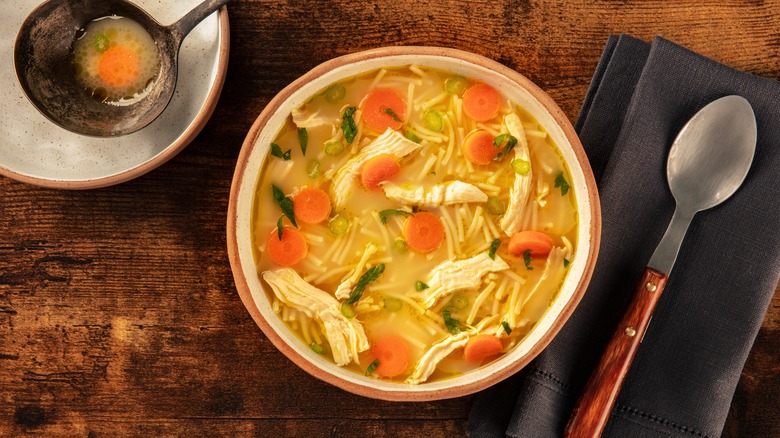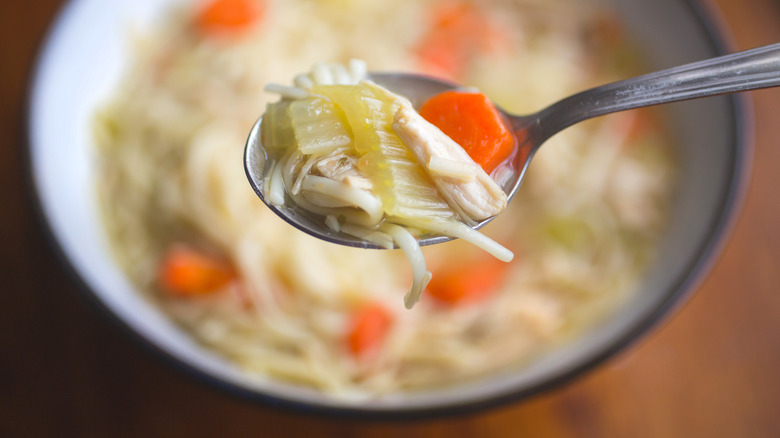The Science Behind Why We Eat Chicken Noodle Soup When Sick
When you have a cold, you eat chicken noodle soup. The idea was ingrained in us as children, when we'd lay in our beds, being fed bowls of chicken noodle soup. No dish are more synonymous with recuperation than chicken soup. Its nourishing reputation has been fostered by cultural phenomena like the Chicken Soup for the Soul book series and its prevalence in the Jewish community, earning the nickname "Jewish penicillin." But how much truth really lies in this reputation?
Chicken soup has been used for medicinal purposes since the second century B.C., when it was referenced in Chinese texts. However, its reputation in the West was largely shaped by the 12th century Jewish philosopher Moses Maimonides, who advocated for treating illnesses through diet and hygiene measures such as exercise, fresh air, and, yes, chicken soup. Although Maimonides did not specifically recommend chicken soup for the common cold, he noted that the dish could help with coughs and chronic fevers.
These days, we tend to take a more critical eye towards home remedies, thanks to a greater understanding of disease. Culinary remedies, such as adaptogen ingredients, are still popular, but we are also more skeptical, having debunked some purported benefits of certain foods like fake aphrodisiacs. One naturally wonders if chicken soup's use as a cold remedy is an old wive's tale as well, and to a certain degree, science does support the claim.
Chicken soup doesn't cure, but rather soothes symptoms
Chicken soup will not cure your cold. In fact, there is no known cure for the common cold. But that doesn't mean it isn't beneficial when you're sick. Chicken soup can soothe several common symptoms and can even give your immune system a boost to help you recover. It's particularly helpful for illnesses that affect your sinuses and digestive tract.
Research into the health impact of chicken soup has been scarce, but a 2000 study at the University of Nebraska Medical Center showed that chicken soup has some anti-inflammatory effects. Inflammation is the cause of many common cold symptoms, particularly sinus issues, caused by white blood cells rushing to your sinuses, making your airways swell up and resulting in runny noses and nasty coughs. Research shows that chicken soup can reduce the number of white blood cells that migrate to your sinuses, soothing inflammation.
Soup is easy to digest, and it may help sick patients recover their appetite, which is essential for getting your body back into optimal condition. Chicken soup has a rich, umami flavor, which can reinvigorate our appetites and improve our bodies' ability to absorb protein. This may be one of the reasons that chicken soup in particular is the go-to soup for us whenever we're feeling under the weather.
The ingredients in your soup makes a big difference
Not all chicken soup is created equal, and the ingredients in your soup will have an impact on its potential health benefits. Homemade chicken soup is the best choice because store-bought varieties typically have higher sodium levels, which can irritate your digestive tract. Making your own chicken soup at home allows you to control the seasoning and add other beneficial ingredients to your preference.
In terms of chicken broth vs. chicken stock, stock is the better choice when you're sick because it's made with chicken bones, which contain key electrolytes like calcium, potassium, magnesium, zinc, and phosphorus. Electrolyte loss is one of the biggest consequences of digestive illnesses, so chicken soup can help to make up for that while being gentle on the gut.
To maximize the benefits of chicken soup, make sure to add vegetables for a boost of vitamins and minerals. Carrots are particularly powerful, as they are a major source of vitamin A, which helps your immune system. Onions and garlic are also important, as they have anti-inflammatory properties that can aid in soothing stuffed airways. You can season the soup to your liking, which is what makes it so appealing when we're sick. Being sick doesn't just take a toll on our bodies — it also wears on our minds, and a bowl of comfort food can do wonders.


